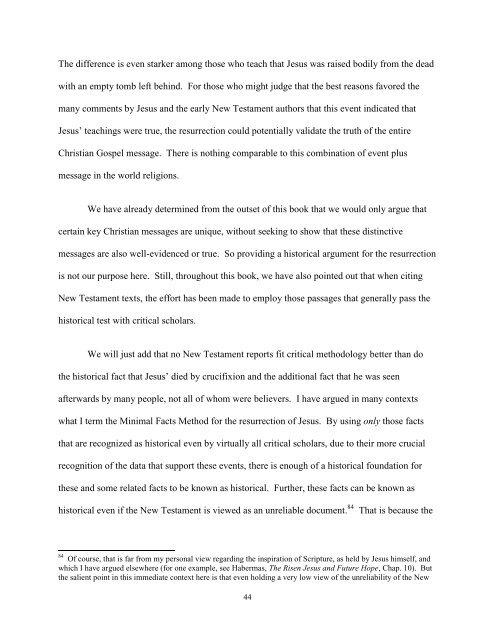Published by
299z7CN
299z7CN
Create successful ePaper yourself
Turn your PDF publications into a flip-book with our unique Google optimized e-Paper software.
The difference is even starker among those who teach that Jesus was raised bodily from the dead<br />
with an empty tomb left behind. For those who might judge that the best reasons favored the<br />
many comments <strong>by</strong> Jesus and the early New Testament authors that this event indicated that<br />
Jesus’ teachings were true, the resurrection could potentially validate the truth of the entire<br />
Christian Gospel message. There is nothing comparable to this combination of event plus<br />
message in the world religions.<br />
We have already determined from the outset of this book that we would only argue that<br />
certain key Christian messages are unique, without seeking to show that these distinctive<br />
messages are also well-evidenced or true. So providing a historical argument for the resurrection<br />
is not our purpose here. Still, throughout this book, we have also pointed out that when citing<br />
New Testament texts, the effort has been made to employ those passages that generally pass the<br />
historical test with critical scholars.<br />
We will just add that no New Testament reports fit critical methodology better than do<br />
the historical fact that Jesus’ died <strong>by</strong> crucifixion and the additional fact that he was seen<br />
afterwards <strong>by</strong> many people, not all of whom were believers. I have argued in many contexts<br />
what I term the Minimal Facts Method for the resurrection of Jesus. By using only those facts<br />
that are recognized as historical even <strong>by</strong> virtually all critical scholars, due to their more crucial<br />
recognition of the data that support these events, there is enough of a historical foundation for<br />
these and some related facts to be known as historical. Further, these facts can be known as<br />
historical even if the New Testament is viewed as an unreliable document. 84<br />
That is because the<br />
84 Of course, that is far from my personal view regarding the inspiration of Scripture, as held <strong>by</strong> Jesus himself, and<br />
which I have argued elsewhere (for one example, see Habermas, The Risen Jesus and Future Hope, Chap. 10). But<br />
the salient point in this immediate context here is that even holding a very low view of the unreliability of the New<br />
44


